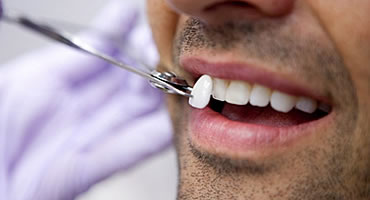Dental Veneers
A great smile can definitely do wonders about one’s appearance. However, not everyone is blessed with a great smile, and there is little that practicing in front of a mirror can really do, especially if one’s teeth are a part of the problem. Cosmetic dentistry, a field of the practice, is dedicated to helping people improve their smiles through improving the appearance and color of the teeth.

One of the most popular procedures in the practice of cosmetic dentistry is the veneer. Here are some of the frequently asked questions about dental veneers, answered.
What is a veneer?
Dental veneers are thin wafers, made of different types of material, placed right on top of a tooth. They are used to improve the appearance of the tooth or to act as protection to the tooth surface to prevent further damage.
What are veneers made of?
Veneers can be made out of any type of material that can withstand the conditions inside a patient’s mouth, can be fashioned thin enough for placement over teeth, and, of course, very durable. These days, however, there are two types of material commonly used for the fabrication of dental veneers: dental composite resins and dental porcelain.
Composite veneers are made of various synthetic resins, which are popular in the practice of both general and cosmetic dentistry for its versatility and safeness. Porcelain veneers, on the other hand, are made of dental-grade porcelain, which is known for being insoluble, biocompatible, and closely resembles natural teeth.
Can I go to any kind of dentist for veneers?
Installing dental veneers is not a general dentistry procedure, and this means that you can only go to a cosmetic dentist for the whole thing—including the consultation and the procedure itself. You might also want to make sure that an experienced cosmetic dentist perform the procedure on you to get the best results.
How many teeth do I need veneers for?
Actually, the answer to this question depends on your teeth—the number varies from patient to patient, and depending on the state of the teeth in question. Typically, patients want to have a uniform color or appearance on their top teeth, and would request for veneers on all teeth in that area.
How does it feel to have veneers?
Veneers are not like dentures—they are extremely thin and designed to be almost invisible. Many of our patients report that they do not feel the veneers after installation, but of course, we understand the other patients who report that they can feel something different on their teeth right after the procedure.
What can veneers fix?
Veneers are not meant to fix anything, but they can cover various imperfections in the patient’s teeth. Unsightly gaps, crookedness, misalignment, and chipping can be masked by the installation of veneers. Veneers can also be a quick fix for tooth discoloration, but only if there are other imperfections to mask. Short teeth, which can be unattractive to some, can be lengthened by veneers.
